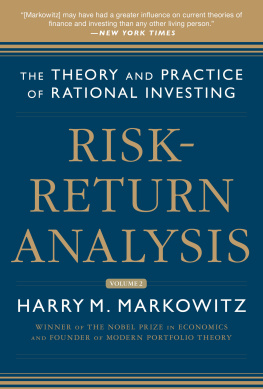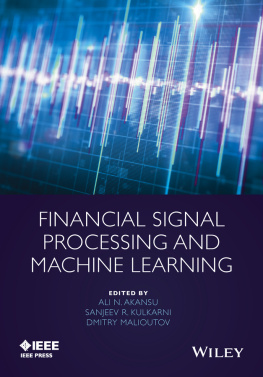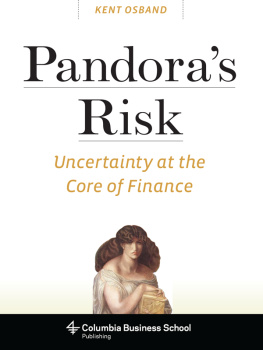Praise for Risk-Return Analysis
Harry Markowitz invented portfolio analysis and presented the theory in his famous 1952 article and 1959 book. Sixty-one years after his initial work, he is writing a four-volume series of books based on his continued development of portfolio theory and management. Nobody has greater insight into the process than Harry. In this first volume, he describes with great clarity and insight rational decision making and the key role of mean-variance analysis. Harry not only answers any questions that have been raised, but also some that havent been thought of. No academic or practitioner can truly claim to understand portfolio analysis unless they have read this volume. I eagerly await volumes 2, 3, and 4 as Harry continues to educate us all.
Martin J. Gruber, Professor Emeritus and Scholar in Residence of the Stern School of Business, New York University
How to use available historical data to quantify the rewards to long-term investing is one of the most important problems in finance. Surveying the vast literature inspired by his own 1959 book, Portfolio Selection: Efficient Diversification of Investments, has stimulated an outpouring of ideas. He builds on the strengths and limitations of the important papers in order to come up with a position that should silence a lot of critics.
Jack Treynor, President of Treynor Capital Management
Most people praise the Modern Portfolio Theory (MPT) paradigm innovated by Nobel Laureate Harry Markowitz, and a few people criticize it, but all share one thing in common: they use it intensively in their academic research and in practical investments alike. What makes the MPT so immense is the amazing optimal combination of three elements: a profound analytical base, strong intuition and a simplicity that makes it easy to implement. No wonder it is still a pillar of modern finance even after six decades since its publication, and I have no doubt it will be the center of modern finance theory for many more years to come. Volume 1 in the series thoroughly covers important investment topics and their relation to the MPT, emphasizing that the mean-variance rule can serve as an excellent approximation to expected utility in virtually all investment scenarios. The authors do not overlook various criticisms of the MPT, but rather address them convincingly. This excellent book is an essential reference to academics and practitioners alike.
Haim Levy, Dean of the School of Business, Hebrew University, Jerusalem, Israel
Harry Markowitzs ground-breaking 1952 and 1959 publications on Portfolio Selection prescribe a methodology that a rational decision-maker can follow to optimize his investment portfolio in a risky world. Risk-Return Analysis is the first installment of a four-part opus that critically reviews and summarizes the academic work on modern portfolio theory that Harry and others have published during the six decades that have followed. This challenging new book clarifies many common misconceptions about modern portfolio theory. It is a wonderful gift to the investment profession.
Roger C. Gibson, Author, Asset Allocation: Balancing Financial Risk, Chief Investment Officer, Gibson Capital, LLC
One hundred years from now, students of financial economics will begin their training by learning mean-variance analysis and portfolio optimization, thanks to the pioneering work of Harry Markowitz. Few scholars have had such impact on both theory and practice as Markowitz, and these volumes contain great wisdom that every economist, portfolio manager, and investor should savor page by page.
Andrew W. Lo, Charles E. and Susan T. Harris, Professor and Director, Laboratory for Financial Engineering MIT Sloan School of Management
Harry Markowitz is a force of nature in our field. He is like a seasonal cyclone that tears through the city of received knowledge and rearranges all the conceptual buildingsinvariably for the better.
His monumental work in the 1950s would be sufficient to qualify as a lifetime achievement for most mortals, but he keeps spouting fresh insights like lightning flashes year after year, and penetrating ever deeper into the theory, mathematics and practice of investing.
Harry Markowitz is without parallel in his intellectual honesty, his enthusiasm, and his courage to tackle the biggest intellectual challenges. He exhibits a compulsion to probe ever deeper into the fundamental mysteries of finance, even when the new findings lead to refining or even upending some of his own prior work. You would think he would occasionally take a breather, give it a brief respite, a pauseif only to allow the rest of us to catch upbut no, Markowitz is relentless in his intellectual pursuit to develop a more comprehensive understanding of all aspects of the investment process.
The current volume, Risk-Return Analysis, integrates a cornucopia of Markowitzs latest thinking, together with the authors structural overview of the current state of the field. The subtitle, The Theory and Practice of Rational Investing, really speaks to two goals. With respect to the first goal, Markowitz and Blay do indeed succeed in presenting a comprehensive theory of investing that is fresh, coherent, authoritative, and yet readable. With the second, and much more challenging goal of injecting rationality into the practice of investing, this book will at least help move the reader a long way down the right path.
Martin Leibowitz, Managing Director, Global Research Strategy, Morgan Stanley
Copyright 2014 by Harry M. Markowitz and Kenneth A. Blay. All rights reserved. Except as permitted under the United States Copyright Act of 1976, no part of this publication may be reproduced or distributed in any form or by any means, or stored in a database or retrieval system, without the prior written permission of the publisher.
ISBN: 978-0-07-181794-3
MHID: 0-07-181794-8
The material in this eBook also appears in the print version of this title: ISBN: 978-0-07-181793-6, MHID: 0-07-181793-X.
E-book conversion by codeMantra
Version 1.0
All trademarks are trademarks of their respective owners. Rather than put a trademark symbol after every occurrence of a trademarked name, we use names in an editorial fashion only, and to the benefit of the trademark owner, with no intention of infringement of the trademark. Where such designations appear in this book, they have been printed with initial caps.
McGraw-Hill Education eBooks are available at special quantity discounts to use as premiums and sales promotions or for use in corporate training programs. To contact a representative please visit the Contact Us page at www.mhprofessional.com.
TERMS OF USE
This is a copyrighted work and McGraw-Hill Education and its licensors reserve all rights in and to the work. Use of this work is subject to these terms. Except as permitted under the Copyright Act of 1976 and the right to store and retrieve one copy of the work, you may not decompile, disassemble, reverse engineer, reproduce, modify, create derivative works based upon, transmit, distribute, disseminate, sell, publish or sublicense the work or any part of it without McGraw-Hill Educations prior consent. You may use the work for your own noncommercial and personal use; any other use of the work is strictly prohibited. Your right to use the work may be terminated if you fail to comply with these terms.
THE WORK IS PROVIDED AS IS. McGRAW-HILL EDUCATION AND ITS LICENSORS MAKE NO GUARANTEES OR WARRANTIES AS TO THE ACCURACY, ADEQUACY OR COMPLETENESS OF OR RESULTS TO BE OBTAINED FROM USING THE WORK, INCLUDING ANY INFORMATION THAT CAN BE ACCESSED THROUGH THE WORK VIA HYPERLINK OR OTHERWISE, AND EXPRESSLY DISCLAIM ANY WARRANTY, EXPRESS OR IMPLIED, INCLUDING BUT NOT LIMITED TO IMPLIED WARRANTIES OF MERCHANTABILITY OR FITNESS FOR A PARTICULAR PURPOSE. McGraw-Hill Education and its licensors do not warrant or guarantee that the functions contained in the work will meet your requirements or that its operation will be uninterrupted or error free. Neither McGraw-Hill Education nor its licensors shall be liable to you or anyone else for any inaccuracy, error or omission, regardless of cause, in the work or for any damages resulting therefrom. McGraw-Hill Education has no responsibility for the content of any information accessed through the work. Under no circumstances shall McGraw-Hill Education and/or its licensors be liable for any indirect, incidental, special, punitive, consequential or similar damages that result from the use of or inability to use the work, even if any of them has been advised of the possibility of such damages. This limitation of liability shall apply to any claim or cause whatsoever whether such claim or cause arises in contract, tort or otherwise.
Next page





